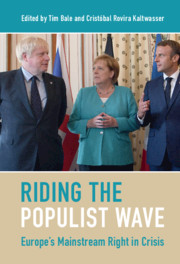
-
Select format
-
- Publisher:
- Cambridge University Press
- Publication date:
- August 2021
- August 2021
- ISBN:
- 9781009006866
- 9781316518762
- 9781009009058
- Dimensions:
- (229 x 152 mm)
- Weight & Pages:
- 0.68kg, 372 Pages
- Dimensions:
- (229 x 152 mm)
- Weight & Pages:
- 0.53kg, 372 Pages
You may already have access via personal or institutional login
Book description
In spite of the fact that Conservative, Christian democratic and Liberal parties continue to play a crucial role in the democratic politics and governance of every Western European country, they are rarely paid the attention they deserve. This cutting-edge comparative collection, combining qualitative case studies with large-N quantitative analysis, reveals a mainstream right squeezed by the need to adapt to both 'the silent revolution' that has seen the spread of postmaterialist, liberal and cosmopolitan values and the backlash against those values – the 'silent counter-revolution' that has brought with it the rise of a myriad far right parties offering populist and nativist answers to many of the continent's thorniest political problems. What explains why some mainstream right parties seem to be coping with that challenge better than others? And does the temptation to ride the populist wave rather than resist it ultimately pose a danger to liberal democracy?
Reviews
‘This book exhibits three main assets: it provides an updated overview of the evolution of the right populist parties; it covers an unusually large number of national cases; it frames the analysis within the dynamics of the different party systems highlighting the relationship between populists and mainstream right parties.'
Piero Ignazi - Università di Bologna
‘This excellent volume brings a welcome balance to the study of European political parties, by examining mainstream right parties, and the tensions and challenges they face. These parties have received less attention than their social democratic and far-right counterparts – yet they are every bit as critical to democracy. The analyses are rigorous, compelling, and indispensable.'
Anna Grzymala-Busse - Stanford University
‘Political scientists and pundits have focused on the supposed crisis of social democracy and the rise of populism in recent years. Little attention has been paid to a party family that has always been crucial for the fate of European democracies: the center-right. This excellent volume offers not only careful case studies of this party family, but also a sophisticated conceptual framework which is bound to inspire and guide further work.'
Jan-Werner Müller - Princeton University
‘While the explosion of populist (radical right) parties and the implosion of social democratic parties are the sexy topics that have been capturing the bulk of the attention of the media and political science, the most important parties in Western Europe are mostly ignored. Riding the Populist Wave, a brilliant collection of original articles by junior and senior scholars, changes that. The book not only explains how the mainstream right has largely survived, and sometimes even thrived, but also highlights the fundamental challenge that populist radical right parties pose to the electoral and political future of the mainstream right, and therefore to liberal democratic politics in Western Europe. One of the most important books in European party politics in this relatively new century!'
Cas Mudde - University of Georgia
‘This ground-breaking book represents a massive development in the study of European parties. The focus on the mainstream right has been limited and this contribution from Bale and Rovria Kaltwasser not only plugs that gap but also sets the agenda for studying and it relationship with the populist wave. The volume offers conceptual development, rigorous comparative work and a vital source on key country cases.'
Paul Taggart - University of Sussex
'This book shows how mainstream right parties in Europe are caught between liberal and progressive forces on the one hand and authoritarian and nativist ones on the other. By combining cross-country comparisons with in-depth case studies, the editors and authors have done a great job showing how, as a result, the mainstream right is undergoing important transformations. Transformations that might well have far-reaching consequences for the functioning of our system of liberal democracy.'
Matthijs Rooduijn - University of Amsterdam
‘The approach of the volume also merits comment, and positively so. Rather than simply bringing together a very strong group of colleagues to discuss ‘their’ country, the editors have provided an overarching theoretical framework, which is then underpinned by two comparative chapters: one demand-side on mainstream right voters, one supply-side on party positions. All of the chapters are grounded in rich empirical data (copiously presented in graphs and tables) and a coherent and incisive analytical framework, reflecting the long intellectual gestion of this project remarked on by the editors in their introduction. Taken together, this allows for a much richer analysis in which the aggregate picture can be unpacked and understood in particular cases. The result is a collection that is not merely indispensable for anyone interested in the mainstream right, but also speaks to the wider transformation of West European party politics, including all those academics looking at other party families. Clearly and logically presented, this volume is also likely to find its way onto the shelves of those journalists and party managers who are trying to make sense of this current political era.’
Simon Usherwood - Journal of Contemporary European Studies
Contents
Metrics
Altmetric attention score
Full text views
Full text views help Loading metrics...
Loading metrics...
* Views captured on Cambridge Core between #date#. This data will be updated every 24 hours.
Usage data cannot currently be displayed.
Accessibility standard: Unknown
Why this information is here
This section outlines the accessibility features of this content - including support for screen readers, full keyboard navigation and high-contrast display options. This may not be relevant for you.
Accessibility Information
Accessibility compliance for the PDF of this book is currently unknown and may be updated in the future.


